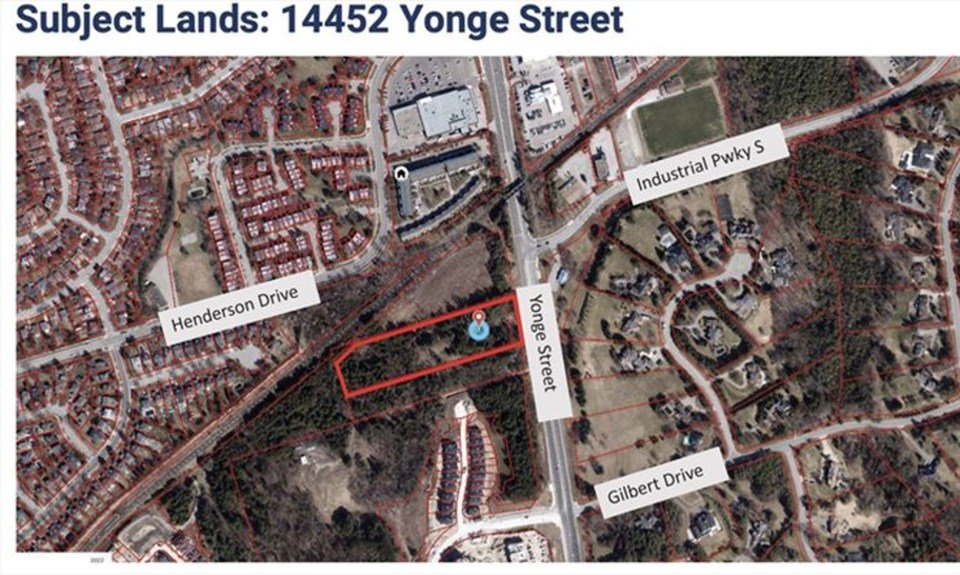York Region won’t take Aurora to the Ontario Land Tribunal over the future of a proposed men’s transitional shelter in Aurora’s south end.
Following a closed session discussion last Thursday, regional council stated on a recorded vote that they would not support the regional government pursuing any Ontario Land Tribunal (OLT) action regarding the men’s shelter, voting as well to consider an alternate location for the build.
The decision came after lengthy discussions around the table, including delegations to last month’s meeting by Aurora residents in favour of the shelter.
“We’re here to support the development of a much-needed men’s emergency shelter and transitional project in the south end of Aurora,” said Aurora resident Len Bulmer, delegating on behalf of himself and fellow resident Kathy Kantel, both of whom have been vocal champions for the proposal.
The men’s shelter was originally proposed for regionally owned land on Yonge Street, just south of the railway tracks near the foot of Industrial Parkway South. Construction on the land is currently underway for a regional pumping station, which would share the site with the shelter if it comes to fruition.
When the proposal was last before council at a public planning meeting, nearby residents were vehement in their opposition, citing safety concerns, potential impacts to property values, and the proximity of the shelter to services needed by the men who could find a place under its roof.
“As we have noted in a previous letter to you, the shelter will be centrally located at the region and it will be located much more closely to the required services than the current, dilapidated, out-of-the-way shelter,” said Bulmer, referencing the existing shelter, operated by Blue Door Shelters, in Holland Landing. “The news from the south of us in the City of Toronto regarding the inability for the city to continue the same level of homelessness and transitional shelter programming is becoming increasingly concerning. Those who, if they actually had housing, would call York Region home, may be increasingly forced back into our communities with no supports – onto our streets, into our parks, in proximity to our places of employment.
“Homelessness is a region-wide problem, one that in all likelihood is going to increase given the extremely high housing costs across the GTA. The 1.2 million of us who live here need our homeless population to have proper support. Our residents need it, our tens of thousands of businesses need it.”
In their delegation, the residents acknowledged opposition “by some 200 people,” but qualified that by saying those who have expressed concern are “adequately housed, well-housed.”
“Unfortunately, their unreasonable fears [were] deemed by the Ontario Human Rights Commission to be discriminatory…that constitute an illegal basis for municipalities in Ontario to make this planning decision. Kathy and I both are grateful that members of this regional council have strongly supported this initiative since it was first proposed more than two years ago. We are especially grateful for the hard work put into the development so far by regional staff. We ask this council to continue to do what it will take to get this project completed. The time for action is now. Residents and business owners don’t want to wait for years until this process restarts itself.”
Following last week’s regional meeting, Mayor Tom Mrakas, who serves as Aurora’s lone voice at the regional table, said he was pleased with the outcome.
“I am pleased to say that, on a majority vote, York Region council recognized the authority of the municipality in local planning issues and passed a motion to refrain from taking the Town of Aurora to the Ontario Land Tribunal,” wrote the Mayor in a statement. “As residents know, I have always been a fierce advocate for a municipality’s authority in local land use planning decisions. I firmly believe that local planning matters should be resolved via the local municipality’s planning processes and regional entities should refrain from intervening. The decision by regional council respects the autonomy and decision-making authority of local governments. The decision also acknowledges that local municipalities are best-equipped to handle matters that directly affect their communities.
“Regional council also passed a motion by Regional Councillor Jackson that I seconded to ensure that ‘That staff be directed to seek council direction prior to commenting and/or appearing before the Ontario Land Tribunal (OLT) on any lower tier municipal Planning Act application.’ This motion ensures that any time staff want to attend the OLT for comment or in support/against of an application, that it needs to be done with local Council approval. This is the process at most of our local municipalities and I believe it should be the same at the regional level. It is important to ensure that it is the elected officials that decide when, how or if the region is represented at the OLT.”
Brock Weir is a federally funded Local Journalism Initiative reporter at The Auroran
